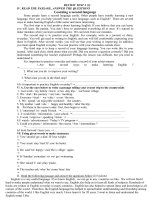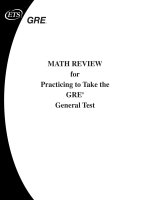SATchem10Organic review test
Bạn đang xem bản rút gọn của tài liệu. Xem và tải ngay bản đầy đủ của tài liệu tại đây (208.94 KB, 2 trang )
SC2 – O’Malley
Q
1.
2.
SAT II Review (Organic)
Because
Because
Because
Statement II
Carbon atoms can bond with each other
It is a linear compound with a triple bond between carbons
3.
Statement I
Carbon is a nonmetal
The hybrid orbital form of carbon in acetylene is believed
to be the sp form
Normal butyl alcohol and 2-butanol are isomers
Because
4.
5.
The reaction of CaCO3 and HCl goes to completion
The alkanes are considered a homologous series
Because
Because
6.
7.
Benzene is a poor electrolyte in water solution
Benzene does not have true single and double bonds
between its carbon atoms in the ring
Long chain hydrocarbons are insoluble in water
Because
Because
Ethylene (C2H4) has a higher carbon-carbon bond energy
than acetylene
Benzene (C6H6) can be drawn as a series of resonance
structures
Because
Isomers vary in the number of neutrons in the nucleus of
the atom
Reactions that form a precipitate go to completion
Homologous series have the same functional group but
differ in the formula by the addition of a fixed group of
atoms
It does not ionize
It is composed of delocalized pi electrons in the ring giving
rise to resonance structures
“like dissolves like” and water contains oxygen and no
carbon and long chain hydrocarbons contain carbon, but
no oxygen
Ethylene contains a double bond and acetylene has only a
single bond between the carbons
Its bonds are a hybrids of single and double bond
character
8.
9.
10.
11. Which of the following has the
strongest carbon-carbon bond?
a. C2H2
b. C2H4
c. C2H6
d. C2H8
e. C2H10
12. Which of the following statements
is true of ethene?
a. Both carbon atoms are sp2
hybridized and the molecule is
planar
b. Both carbon atoms are sp2
hybridized and all bond
angles are approximately
109.5 o
c. One carbon atom is sp
hybridized while the other is
sp2
d. Both carbon atoms are sp3
hybridized and all bond
angles are approximately
109.5 o
e. Both carbon atoms are sp
hybridized and the molecule is
planar
13. Which of the following is the
formula for a non-cyclic, saturated
hydrocarbon?
a. C7H12
b. C7H14
c. C7H16
d. C7H18
e. C7H20
14. What functional groups are present
in the compound below?
O
C
H3C
a.
b.
c.
d.
e.
OH
O
Ester and ether
Ester and amine
Ester and carboxylic acid
Ether and carboxylic acid
Ether and ketone
Because
Because
15. Which of the following compounds
contains the greatest percentage of
oxygen by weight?
a. C3H6O5Cl
b. C3H6O2
c. C5H10O5
d. C4H8O3
e. All are equal
16. The first and simplest alkane is
a. Ethane
b. Methane
c. C2H2
d. Methene
e. CCl4
17. Compounds that have the same
composition but differ in structural
formulas
a. Are used for substitution
products
b. Are called polymers
c. Are usually alkanes
d. Have the same properties
e. Are called isomers
18. Ethene is the first member of the
a. Alkane series
b. Alkyne series
c. Saturated hydrocarbons
d. Unsaturated hydrocarbons
e. Aromatic hydrocarbons
19. The characteristic group of the
organic ester is
a. –COb. –COOH
c. –CHO
d. –Oe. –COO20. Coke is produced from bituminous
coal by
a. Cracking
b. Synthesis
c. Substitution
d. Destructive distillation
21. An ester can be prepared by the
reaction of
a. Two alcohols
b.
c.
d.
e.
An alcohol and an aldehyde
An alcohol and an organic
acid
An organic acid and an
aldehyde
An acid and a ketone
22. The usual method for preparing
carbon dioxide in the laboratory is
a. Heating a carbonate
b. Fermentation
c. Reacting an acid and a
carbonate
d. Burning carbonaceous
materials
23. Slight oxidation of a primary
alcohol gives
a. a ketone
b. an organic acid
c. an ether
d. an aldehyde
e. an ester
24. The organic acid that can be made
from ethanol is
a. acetic acid
b. formic acid
c. C3H7OH
d. Found in bees and ants
e. Butanoic acid
25. The normal electron configuration
for ethyne (acetylene) is
a. H:C::C:H
b. H:C:C:H
c. H•C:::C•H
d. H:C:::C:H
e. H:C:C:H
26. The atomic structure of the alkane
series contains hybrid orbitals
designated as
a. sp
b. sp2
c. sp3
d. sp3d2
e. sp4d3
27. Which of the following statements
is the best expression for the sp3
hybridization of carbon electrons?
a. The new orbitals are one s
orbital and three p orbitals
b. The s electron is promoted to
the p orbitals
c. The s orbital is deformed into
a p orbital
d. Four new and equivalent
orbitals are formed
e. The s orbital electron loses
energy to fall back into a
partially filled p orbital
34. Which of the following is the
functional group of an ether?
a. R—OH
b. R—O—R’
c.
d.
e.
28. The following statements about
carbon dioxide are true EXCEPT
a. It can be prepared by the
action of acid on CaCO3
b. It is used in fire extinguishers
c. It dissolves in water at room
temperature
d. It sublimes rather than melts
at 20 oC and 1 atm pressure
e. It is a product of
photosynthesis in plants
29. The structure of the third member
of the alkyne series is
a. H—C≡C—H
b. H—C≡C—CH3
c. H—C≡C—CH2CH3
d. H—C≡C—C≡C—H
e. H—C—C—CH=C—H2
R
R
R
O
C
O
C
O
C
R'
OH
H
35. A triple bond may best be
described as
a. Two sigma bonds and one pi
bond
b. Two sigma bonds and two pi
bonds
c. One sigma bond and two pi
bonds
d. Three sigma bonds
e. Three pi bonds
Answers:
1.
T, T, CE
2.
T, T, CE
3.
T, F
4.
T, T
5.
T, T, CE
6.
T, T, CE
7.
T, T, CE
8.
T, T, CE
9.
F, F
10. T, T, CE
11. A
12. A
13. C
14. D
15. C
16. B
17. E
18. D
19. E
20. D
21. C
22. C
30. The primary products of
hydrocarbon combustion are
a. Water and carbon
b. Water and carbon monoxide
c. Water and carbon dioxide
d. Hydrogen and carbon
monoxide
e. Hydrogen and carbon
23. D
31. The production of alkanes from
alkenes is accomplished by
a. Burning in the presence of
water
b. Distillation
c. Methylation
d. Catalytic hydrogenation
e. Hydrolysis
29. C
32. sp2 hybridization will be found for
carbon in
a. CH4
b. C2H4
c. C2H6
d. CH3OH
e. CH3OCH3
35. C
33. The functional group shown below
represents
R
a.
b.
c.
d.
e.
O
C
H
An alcohol
An ether
An aldehyde
A ketone
An organic acid derivative
24. A
25. D
26. C
27. D
28. E
30. C
31. D
32. B
33. C
34. B









